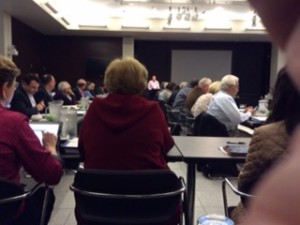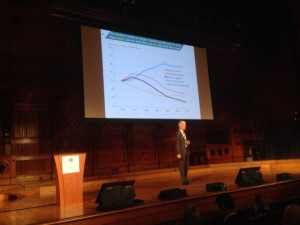Last week was full of conference talks for me. I’m not really a fan of these sorts of meetings, but I was asked to speak on liberal education at Aspen and Cambridge and thought I’d take the opportunity to wave the flag. Both meetings turned out to be really interesting, full of ideas that might be relevant for Wesleyan in the future.


At Aspen, I was particularly impressed by talks I heard by Donald Berwick on health care and continuous improvement; by Eric Mazur on innovations in the flipped classroom; by Maya Jasanoff on globalization and educational quality; and by Robert Putnam on educational inequality. Don Berwick has run Medicare and was a major figure in the planning and implementation of policies that led to the Affordable Care Act. He gave a powerful talk on how to create a culture of continuous improvement in an organization. This is not done through heroic individuals but through an entire workforce acting as a team to offer better services while holding down costs. He knows it can be done because he has seen it work! I am still thinking about how the analogy might work with higher education.
Eric Mazur is a legend in innovative pedagogy. You can check out his flipped classroom ideas here. At Aspen he reminded the audience that even a great lecturer (he is one) can create a better learning environment through the use of readily available technologies that in the end support peer learning. After giving us a simple physics lesson, Eric had us on the edge of our seats as we debated with one another an answer to a basic question about the heating of hard solids. Really! And project-based learning can work, he suggested, in any discipline.
Maya told us a historical tale of globalization, focusing on shipping. Having herself taken a cargo ship from Hong Kong to Europe, she described the ways in which globalization in the beginning of the 20th century drove down the price of goods but also increased certain basic forms of inequality. Will the same thing happen today with the globalization of education? Will we lose the research and preservation dimensions of the academy, and will we accelerate trends of inequality through which only the elite have access to high-touch, high-quality learning experiences?

Inequality was the core of Robert Putnam’s very moving talk based on the research from his latest book, Our Kids. He described to this audience of higher ed leaders how his own hometown of Fort Clinton, OH has suffered from de-industrialization and worse. Not everyone has suffered, of course. One of the key determinants for one’s prospects for a decent life? Education. In today’s America, if you don’t have the opportunity to attend college, your chances for basic economic security, health care…even a fulfilling family life, are dramatically reduced. Putnam has strong data on this, but he brought the point home with powerful stories of how many children today, our kids, are being condemned to blighted lives while others are given the support they need to take care of themselves and contribute to their communities.
While on the road, whether I was talking with the Dean of the Humanities at Hong Kong University or an entrepreneur whose company teaches English online (both of whom were on my panel at Harvard), I am continually struck by the relevance of the experiments going on here at Wesleyan. Our faculty, staff and students are rethinking higher education while they are in the middle of it, making innovation a reality on campus. This is practical idealism at its best!



President Roth,
Thank you for your inspiring leadership. Under your wing, Wesleyan is becoming stronger than at any time in its past. I am proud to be a graduate of the university that has you as its president.
President Roth,
As the parent of an incoming Freshman and a Community College Instructor for over 30 years I am concerned over the quality of “on – line” courses. I teach sequel courses and the vast majority of my students are not prepared for upper level work if they have taken on – line intro courses. This approach cannot be the “Future of Higher Ed.” We have to find a better balance if “on – line” is here to stay.
Dr. Roth – Your interest in Donald Berwick’s work in continuous improvement (CI) prompts me to contact you. As you think about how CI might work higher education, I’d like to direct your attention to two books I have written that explain how CI works higher education: Lean University: A Guide to Renewal and Prosperity and Lean Teaching: A Guide to Becoming a Better Teacher. As I am located in Wethersfield, Connecticut, I would be happy to drop by anytime that is convenient for you and deliver a copy of each book to you, no strings attached. And, we could chat about CI and how to correctly introduce it into higher education.